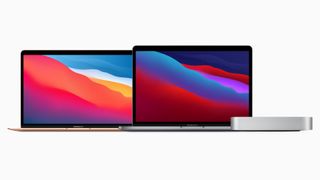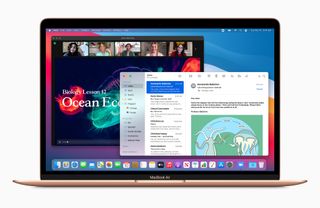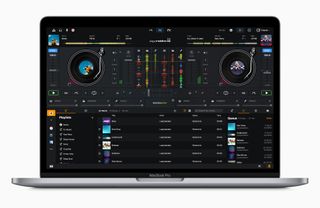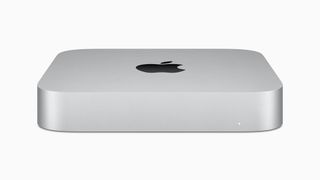Apple unveils updated Mac lineup powered by its new M1 chip
The M1 chip is the first-ever personal computer chip built using 5-nanometer process technology

After much rumour and anticipation, Apple has finally launched its own first-party processors, which have debuted in a range of updated macOS devices.
After launching the iPhone 12 last month, the company held another “One More Thing” event to show off the new hardware, which includes updates to the MacBook Air, MacBook Pro and Mac Mini, all of which are powered by its all-new M1 chip.
Apple M1 chip

The Apple-built M1 chip is the first-ever personal computer chip built by the company in-house, and the announcement marks the first time since 2006 that new Macs will be powered by anything other than Intel processors.
The M1 is built on Arm architecture, and Apple says it’s the first PC chip built using 5-nanometer process technology. This eight-core chip also packs 16 billion transistors, the most ever in an Apple chip, and enhanced machine learning performance with the Apple Neural Engine.
Within the M1’s eight cores are four high-efficiency cores that save on power while still delivering "industry-leading" performance, and this comes at one-tenth of the power consumption of the current dual-core MacBook Air.
The M1 chip boasts many Apple-claimed records, including being the fastest CPU core in low-power silicon, the world’s fastest CPU per watt and the world’s fastest integrated graphics in a personal computer. Generally, personal computers require three or more chips for the CPU, I/O, security and other functions. The M1 chip can handle all these tasks itself, eliminating the need for three power-draining chips.
All this tech adds up to 3.5 times faster CPU performance, up to six times faster GPU performance, and up to 15 times faster machine learning than other personal computer chips, according to Apple. On top of the superior performance, the M1 chip also supposedly allows the MacBook Pro and MacBook Air to deliver about twice the battery life of previous-generation Macs.
Get the ITPro. daily newsletter
Receive our latest news, industry updates, featured resources and more. Sign up today to receive our FREE report on AI cyber crime & security - newly updated for 2024.
The M1 chip also brings the Apple Neural Engine to the Mac lineup, supposedly accelerating the devices' machine learning (ML) capabilities by up to 15 times. This, Apple says, will enable the Mac lineup to deliver quick video analysis, voice recognition and image processing.
MacBook Air

According to Apple, the MacBook Air is the world’s best-selling 13in laptop, and the new-generation model aims to hold that title with significant improvements.
This starts with the new eight-core M1 chip, which Apple says makes it up to 3.5 times faster than the previous MacBook Air. The eight-core GPU also allegedly enhances its video performance, allowing it to process graphics five times faster for minimal lag. Machine learning should get a big boost with the Air’s M1 chip too, as the company claims it’s nine times faster than the previous MacBook Air. This will speed up a wide range of ML tasks, like facial recognition or object detection.
All told, Apple claims the MacBook Air with the M1 chip is faster than 98% of all PC laptops sold in the past year.
As we mentioned above, Apple says the M1 chip is also far more efficient. With the new chip, the MacBook Air delivers up to 15 hours of wireless internet browsing and 18 hours of video playback on a charge.
The MacBook Air promises plenty of other useful updates, including improved camera image quality with reduced noise, greater dynamic range and improved white balance; a more vibrant and true-to-life Retina display; Wi-Fi 6 connectivity; two Thunderbolt ports with USB 4 support; and a fanless design for minimal noise.
The MacBook Air comes in two base configurations - one with a 256GB SSD and a seven-core GPU, and one with an eight-core GPU and 512GB of storage. Both allocations feature 8GB of RAM as standard, which can be upgraded to a maximum of 16GB.
The 256GB configuration costs just $999 in the US and £999 in the UK. The 512GB hard drive pushes the starting price to $1,249 in the US and £1,249 in the UK. Education customers can get the MacBook Air for $899 in the US, but Apple hasn’t announced its UK educator pricing.
The MacBook Air is available for preorder now, and deliveries will begin November 17.
13in MacBook Pro

The all-new 13in MacBook Pro takes what the MacBook Air offers and kicks it up a notch to meet more specialized demand. Generally, the added functions meet the needs of graphic designers, audio and video editors or students studying in these fields.
The MacBook Pro starts with the same M1 eight-core chip as the MacBook Air which, according to Apple, makes it significantly faster than most other PCs on the market. With this new chip, Apple claims the MacBook Pro’s battery lasts 17 hours when wirelessly browsing the internet or 20 hours when watching videos.
The MacBook Pro also promises 'studio-quality' microphones for clearer audio, and improved image quality for video calls thanks to the M1's image signal processor. Like the MacBook Air, the MacBook Pro features two USB 4-enabled Thunderbolt ports and a default RAM allocation of 8GB, which can be boosted to a maximum of 16GB at point of purchase.
The 13in MacBook Pro with a 256GB solid-state hard drive retails for $1,299 in the US and £1,299 in the UK. Bumping to the 512GB hard drive pushed the price to $1,499 in the US and £1,499 in the UK. For educators, the MacBook Pro starts from $1,199 in the US. UK educator prices aren’t available yet.
The MacBook Pro is available for preorder now, and deliveries will begin November 17.
Mac Mini

Folks who want laptop portability with desktop functionality may prefer the Mac Mini, a high-powered small-form-factor desktop.
The Mac Mini’s big update is the new M1 chip, and like the Air and Pro, Apple claims it's three times faster than its predecessor. This small desktop also apparently features six times improved graphics performance and 15 times improved machine learning compared to the previous Mac Mini. All this power comes in a package that’s one-tenth the size of the average desktop tower.
Other upgrades to the new-generation Mac Mini include an advanced thermal design to help it stay cool and quiet, support for dual monitors and Apple Pro Display XDR in full 6K, and Wi-Fi 6 connectivity.
The Mac Mini with a 256GB solid-state hard drive runs $699 in the US and £699 in the UK. Increasing the storage to 512GB bumps the price to $899 in the US and £899 in the UK. As with the laptops above, RAM starts at 8GB but can be increased to 16GB.
This tiny desktop is available for order now, and deliveries will start November 17.




